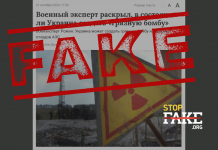
NEW REPORT: Handbook on Countering Russian and Chinese Interference in Europe
Analysis of the texts of annual intelligence reports has proven what the European Values Center for Security Policy has been claiming for years. The hostile influence operations are not a random occurrence, nor are they a phenomenon that concerns a few countries only. In fact, our research has uncovered a broad consensus among the intelligence agencies in terms of existing tactics and tools applied by Russia and China. In other words, our long-held stance has now been backed by “hard data” i.e. texts of intelligence agencies. Report available here.
Topics of the Week
| Sputnik Estonia closes its bureau in Tallinn due to the financial sanctions. |
| Taiwan passes law to combat Chinese political influence. |
| US Cybercom developing ways to counter Russian interference in the 2020 election. |
Good Old Soviet Joke
Two guys crawl through a desert, exhausted and completely dehydrated. Suddenly, one of them says: “Shout something anti-state!”
“Why?” the second one wonders.
“Maybe they’ll send water cannons.”
Policy & Research News
Russia cuts off oil supplies to Belarus
On Friday, it was announced Russia had stopped its supply of oil to Belarus as talks on strengthening economic ties between the two countries remained at a stalemate due to concerns from Belarus that Russia could effectively swallow up the country. As CBC details, these Belarussian concerns have been fuelled by Russia’s annexation of Ukraine’s Crimean Peninsula and its support for separatist insurgents in eastern Ukraine. The Kremlin wants Belarus to accept a closer economic relationship with Russia and is actively applying pressure on the Eastern European nation to do so. Russia is demanding Belarus must accept a greater economic integration in order to continue receiving energy resources at Russian domestic prices.
Russian President Vladimir Putin and Belarusian President Alexander Lukashenko had held two rounds of talks in December but failed to reach an agreement on the closer ties and on oil and gas prices. As The New York Times reports, Putin said Russia was not ready to “subsidize” energy supplies without a closer economic integration with Belarus, while Lukashenko insisted he would not sign off on the integration until the issues with oil and gas supplies were resolved. Furthermore, soon after the failed meeting, Lukashenko ordered his government to look for alternative oil suppliers
While limited oil supplies from Russia to Belarus were resumed the following day, the Belarus case further demonstrates how the Kremlin is willing to use energy dependency as a way to bully smaller neighbouring nations in an attempt to achieve its own objectives. Belarus relies on Russia for 80% of its overall energy needs and 90% of its crude oil. Furthermore, a consequence of having the oil supply from Russia being cut off Belarus had to suspend its own oil export, which contributes to around 20% of its annual GDP. Likewise, leading up to the annexation of Crimea, Russia used energy supplies as political leverage to keep Ukraine in its economic orbit and from developing closer ties with Europe.
Sputnik Estonia closes its bureau in Tallinn after sanctions
Brought to you by the Vilnius Institute for Policy Analysis
“Sputnik News” is once again on the front pages of Baltic and Russian media outlets as Estonia continues its fight against disinformation. According to recent developments, Sputnik Estonia had ceased its operations after Swedbank notified Sputnik’s employees of the breakdown of service contracts and the closure of their accounts.
Financial sanctions as such should not come as a surprise since Sputnik News with its regional offices is owned by Russia’s state-funded company “Rossiya Segodnya”. Its owner is Dimitry Kiseliov, who is currently on the list of persons subject to restrictive measures in view of Russia’s actions in Crimea (Full list of persons and entities under EU restrictive measures over the territorial integrity of Ukraine can be viewed here).
However, such end result has once again given Russian media enough material to promote its propaganda narratives. For instance, newspaper Vzglyad states that “the Baltic countries are carrying out a religious war against Russian media outlets and describing Sputnik News as “pure” and “righteous”. Additionally, while portraying “Sputnik” as the epitome of truth is already highly damaging in itself, it also implies that the governments of Estonia and other Baltic states are devilishly working on closing down truthful minority-oriented sources of information, leaving Lithuania, Latvia and Estonia with an image of an undemocratic and hostile region.
News regarding the closure of “Sputnik Estonia” office had echoed not just through the media but through corridors of power as well. According to Valentina Matviyenko, the Senator from Saint Petersburg and Chairwoman of the Federation Council, Estonia should consider changing its attitudes towards Russian mass media. Otherwise, Russia will take “extremely harsh retaliatory actions”. Moreover, Vladimir Putin, President of the Russian Federation also commented on this matter, saying that recent developments in Estonia should be ragweed as a clear sign of “cynicism” and that Estonian government is clearly “scared of Russian journalists” operating on its soil.
Taiwan passes law to combat Chinese political influence
Taiwan’s parliament has passed an anti-infiltration law on Tuesday to combat perceived threats from China as the island prepares for a presidential vote on 1tth January, amid increased tensions with Beijing. As detailed by Reuters, the legislation is part of a years-long effort to combat Chinese efforts to influence politics and the democratic process, through illicit funding of politicians and the media and other methods. The law bans hostile foreign forces from activities such as campaigning, lobbying, making political donations, disrupting social order or spreading disinformation related to elections.
The move further strains ties between Taiwan and Beijing, who suspect Taiwan President Tsai Ing-wen of pushing for the island’s formal independence. China has been upfront about its dislike for President Tsai, who opposes closer ties with Beijing. The Communist Party claims Taiwan as part of China’s territory, and it has long deployed propaganda and intimidation to try to influence elections here. However, the Taiwanese government has strengthened laws against spreading harmful rumours. Moreover, companies such as Facebook, Google and the messaging service Line have agreed to police their platforms more stringently, while government departments and civil society groups now race to debunk hoaxes as quickly as they appear. The upcoming election will put these efforts and the resilience of Taiwan’s democracy to the test.
US Developments
US Cybercom developing ways to counter Russian interference
US Cyber Command is developing information warfare tactics to counter Russia’s interference in the 2020 presidential elections. A possible tactic could include targeted information warfare against the members of the Russian elite, just like the targeted economic sanctions have focused on individual persons. This tactic could include revealing information about the personal corruption of the Russian elite. Cybercom has already gotten more freedom to conduct operations against foreign adversaries. In 2018 midterm elections, Cybercom took an active defence approach, targeted Russian internet trolls in advance, and finally took their servers down if the trolling continued. In December 2019, the Senate created a new principal information adviser position to enhance Pentagon’s ability to conduct cyber operations like the one before midterm elections.
Russia tests unplugging its internet from the global network
The Russian government announced that it has conducted a test of isolating its internet from the global internet. Russia’s “sovereign Runet” is a project of creating a domestic internet, which the government is able to control. Russia has already isolated about ten percent of the most critical parts of its internet, and sovereign Runet would mean getting that number up to 90 percent isolation from the global network. The project has many technical challenges with blocking all the foreign connection points to Russia’s infrastructure and re-routing the domestic networks. This challenge is present in Russia’s failure to block the messaging app Telegram from the Russian internet.
The project is connected to other Russian plans, such as creating its own “detailed and reliable” Wikipedia by 2023, and the already passed law of requiring all the new smartphones to include pre-installed Russian software.
Kremlin’s Current Narrative
New Year, Same Tactics
Last Friday, a US attack on two Iranian SUVs in Baghdad led to the death of several high-ranking officials including the head of the Iranian elite Quds Force, Qassem Soleimani. The event was the culmination of rising tensions between the United States and Iran after a US raid on an Iraqi Shia militia which triggered demonstrations at the US Embassy in Baghdad – a siege which Washington attributes to Tehran’s instigation. The Pentagon claimed that the strike is a “decisive defensive action” to “[deter] future Iranian attack plans.”
Evidently, this subject warranted a more delicate treatment from Moscow’s narrative playbook. The Kremlin’s official position regarding the events, communicated in a short statement from the Foreign Ministry, only states that the US strike is “an adventurous move that will lead to an escalation of tension throughout the region” (though it also acknowledges Soleimani’s role in the struggle against the Islamic State). In Russian state media, an explicit judgment of the developments is rarely offered. Instead, the headlines use quotes from prominent political leaders and analysts to stress the aggressive strategy of the US – a tactic often used in the promotion of Russia’s preferred narratives in a subtle, seemingly neutral way. For example, an article which reports the positions of both Democrats and Republicans regarding Trump’s authorization of the strike is entitled “‘Trump just threw a dynamite stick into a tinderbox’: US Democrats savage US strike that killed Iranian Quds chief Soleimani.” In this way, the preferred narrative stressing the negative assessment of the United States by the Democrats is promoted, while claims for objectivity and neutrality are preserved as the article itself mentions the positive appraisal of the Republicans, too.
Overall, it appears that the negative portrayal of the United States through quotations from (perceived) authoritative sources significantly outweighs the positive one. For instance, other headlines cite the Iranian Foreign Minister (the attack as an “act of international terrorism”), the Iranian President (“cowardly act [that confirms] “the weakness of the United States”), the Iraqi Prime Minister (violation of Iraq’s sovereignty) and Chinese Foreign Ministry spokesman (accusations of “destabilizing presence” and “military interventionism”) among others. Again, some positive perceptions of US actions are reported, though they are few and far between. For example, one news item offers Natenyahu’s view that the US bombing is an act of “self-defence” and a “just struggle.” However, a later headline emphasizes that “Netanyahu backs away from Soleimani assassination, warns ministers to ‘stay out’ of purely ‘American event.’”
Kremlin Watch is a strategic program of the European Values Center for Security Policy, which aims to expose and confront instruments of Russian influence and disinformation operations focused against the liberal-democratic system.





